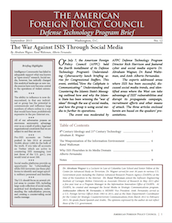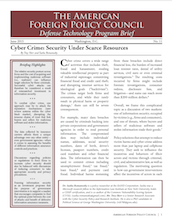Missile Defense Briefing Report: No. 339
The Navy task force that will run NATO missile defense;
Iran deal ignites regional arms race;
Iron dome for export;
New Russian military advances;
Pentagon looks "
left of launch"
Patriots stuck in Turkey
The Navy task force that will run NATO missile defense;
Iran deal ignites regional arms race;
Iron dome for export;
New Russian military advances;
Pentagon looks "
left of launch"
Patriots stuck in Turkey

On July 7, the American Foreign Policy Council (AFPC) held the fourth installment of its Defense Technology Program’s Understanding Cybersecurity lunch briefing series for Congressional Staffers. This event, entitled, “How the Caliphate is Communicating:” Understanding and Countering the Islamic State’s Messaging outlined how and why the Islamic State has been winning the “war of ideas” through the use of social media, and how the group is using social media to further its operations...

Cyber crime covers a wide range of activities that includes theft, fraud and harassment; stealing valuable intellectual property as part of industrial espionage; committing financial fraud and credit card theft; and disrupting internet services for ideological goals (“hacktivism”). The crimes target both firms and consumers, and while they rarely result in physical harm or property damage, there can still be severe consequences...
Missile defense for the Gulf;
Ukraine seeks BMD as a hedge against Russia;
In the Army, a focus on integration;
Beijing, Moscow make missile moves
North Korean capabilities cause Western, Eastern worries;
Pyongyang invests in its "
satellite"
program;
Debate over third U.S. interceptor site rages on;
New horizons for the S-400